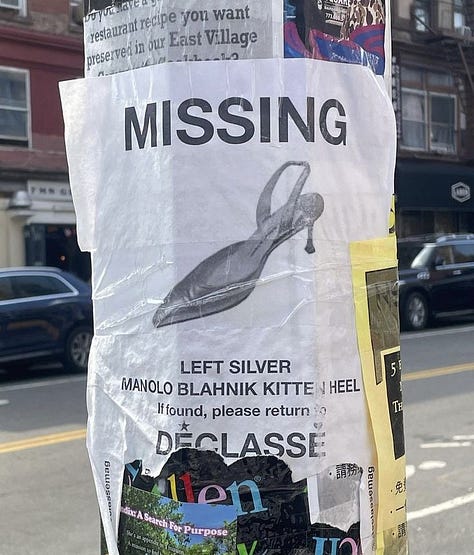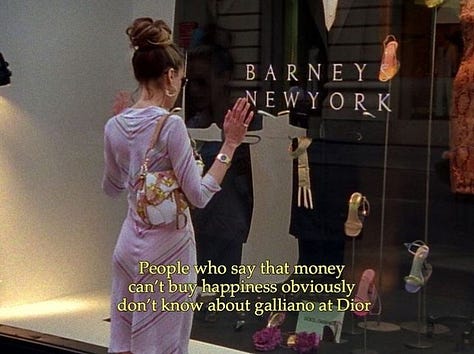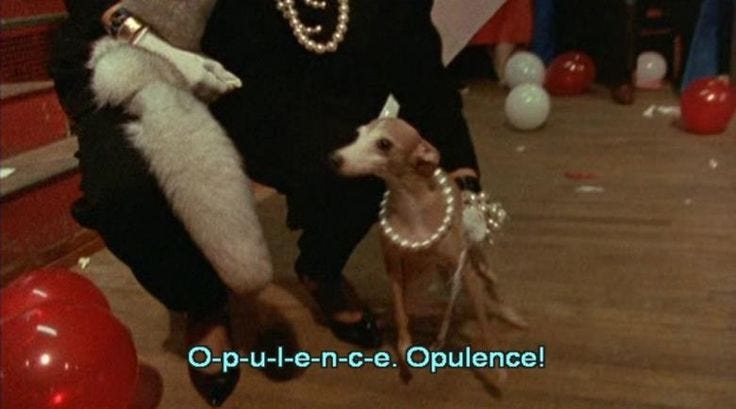At The Age of Shopping
And I couldn't help but wonder…about The End Of History and the femenine necessity to consume
My best friend is a shopaholic. It's okay, do not sound the betrayal bells, she knows it and I know it— frankly, odd is the person who does not know it. She is a consumer of consumer culture; always up to date with the latest fashion and beauty releases and your most trusted “what to wear” advisor. I love her passion for style, yet sometimes I worry it swallows her up.
For the past two weeks, she has been trying to convince me to buy matching dresses and I have profusely refused. It’s not because I dont have a heart but because she wants to get matching LoveShackFancy’s Rialto Floral Chiffon Maxi Dresses. For those of you who have not been sent approximately 15 videos a day of this dress, it has become a popular pick for many girls to wear to formal events like weddings and prom. While it's beautiful, it's also over $700…
I love fashion as much as any other Sex And The City aficionado but $765 for a dress I don’t know if I’ll ever wear is a little bit out of my price range. I have other priorities and needs to fulfill; as I told her, I like it but dont need it.
But for her, fashion is not a want but a need.



Psychologist Abraham Maslow argued that our needs are hierarchical; to achieve what is considered as higher needs (e.g., “self-esteem”) we must first fulfill basic needs. He posed that there were 5 needs for humankind: physiological, safety, love and belonging, esteem, and self-actualization. But The Blonde’s “need” for sophisticated consumption has always surpassed her perceived understanding of her basic needs.
“It’s SHOMO” she wailed over lunch “I’m afraid that some other girl will have my dress and I’ll be left without it!”
SHOMO ™, for those unaware, means Shopping FOMO (fear of missing out); a perceivably silly but extremely valid fear for women of the century, for women of “The End of History”.
In 1992, Francis Fukuyama presented the idea that we were facing a time marked by the achievement of the “telos” of our world: the ideological win of liberal democracy, an ideology that, despite its flaws, represented the “pinnacle of political organization”. In the 90s, Fukuyama saw a world increasingly shaped by this ideological victory leading to a bigger concern placed on "[the] endless solving of technical problems, environmental concerns, and the satisfaction of sophisticated consumer demands."
Fukuyama as a theorist is flawed yet I feel compelled to agree with “The End of History”— at least to some extent. Time has proved that ideological conflict is a part of the human political experience but it must be recognized that Consumer Culture has bought itself a place amongst dominant ideologies. I am not the only one who has pointed this out, but, our culture is becoming increasingly dependent on a system of quick consumption; by consumer demands. Fukuyama would argue that it is the consequence of a bored world, a world where “the last man” is born and embraced.
While it sounds dramatic to think of the “last man”, they are not all that foreign to us. The best way to simplify it is, as cultural critic Broey Deschane1l does, to think about Carrie Bradshaw. In her video “Love at the End of History”2, Deschanel reflects on how the 90s zeitgeist was permeated by the sense that we were now sleepwalking through the world. Having left the ideological complexities we became increasingly selfish looking for gratification and pleasure. The 90s were fueled by individualism and the rise of the cosmopolitan consumerism. Carrie is a product of her time in that way. A citizen of a liberal democracy who is content with material comfort but lacks a deeper sense of purpose or struggle. The poster girl for the 90s New York socialite, Carrie Bradshaw had all that post-feminist theory desired and the lifestyle the consumer world showed us to envy and mimic.



Historian Keithy Peiss3 writes, “Women’s identities have been shaped by their roles as consumers, and the products they buy become a means of self-expression and social status.” Since the conception of the capitalist market in our modern world, a big part of it has been targeted at women. In part, the rise of cultural icons like Carrie, Rebbeca Bloomwood, and Cher Horowitz is because the economic trends of “The End of History” encouraged it. Women’s way in the world, as understood by the media, was paved by the market. A market that cared little for positive female representation or subverting stereotypes.
In Carrie’s case, her clothes and shoes are her and how she understands the world. It is her purchases that explain community and culture to her. Think of episodes like “A Girl’s Right to Shoes” or “Ring a Ding Ding” where it becomes evident that shopping is not a want for Carrie but a need that has made it implausible for her to prioritize what Maslow would call “basic needs”. Rather, she pushes her need for physical and economic safety below her need for Manolo Blanhiks.
It is here where criticisms of Maslow’s hierarchy of needs become evident. The human, it seems, can reprioritize their needs and pursue more than a single one at a time. It’s tempting to judge the admission of experience SHOMO but in a way, we all do. As children of the 21st century, most of us have grown up in a world where our identities have been built upon what we own. We have been sold the idea that in a modern hierarchy of needs, the top tier (self-actualization) is achieved through mass consumption.
The Blonde and I know it (objectively). We are children of consumption culture. Girls who were taught that how you present yourself is just as important as who you are. Girls who learned from movies that the right dress can change your life and make you who you need to be. SHOMO, in a way, is inevitable if what we feel we are missing out on is the next great version of ourselves.
For The Blonde sophisticated consumer goods have always been a way to empower herself. She has always been a trendsetter, a little influencer, and as fabulous as Serena Vanderwoodesn. But she (and I feel for her in this way) always yearns for more. The last man, the SATC girls, and all the children of the 21st century are all deep down bored and lonely. We search for gratification in the next click, the next purchase, the next dress.
Yet, lately, I have found that the biggest source of gratification is not the objects I purchase but the community I nurture and the love that overwhelms it. True satisfaction doesn’t come from boundless shopping or spending. The meaning of female identity isn’t bound to it either. Women are more than dresses and shoes; women are people, lovers, and friends. History is far from over. While mass consumption is our current trend, it is not our fate.
Fashion is a fabulous means of expression that I will always adore. I love seeing trends and designs yet find increased comfort in knowing that I dont need every new dress. It’s okay if I don’t constantly renew my wardrobe because my worth is not placed in my collection of shoes or skirts. I am a person, a woman, far apart from what my capital consumption might indicate.
I will not claim to have “freed myself” from consumerism or turned into a counter-cultural girl. I still enjoy shopping and long for a pair of Manolo Blahniks myself. But rethinking what we have made our needs to be is liberating. SHOMO is real, but like any other fear, it doesn't have to devastate you.
At the end of the day, no dress will ever compare to the bond The Blonde and I share. It’s true what they say—you can’t put a price on love or friendship, not even in the age of shopping.
Broey Deschanel, also known as
, has a really cool Substack! Tagging her because she makes super cool things and is one of the creators I most admire 💗Broey Deschanel. “Sex And the City: Love at the End of History.” YouTube, 23 Nov. 2021, www.youtube.com/watch?v=mIbIcJHKnXM.
Peiss, Kathy. "10. Making Up, Making Over: Cosmetics, Consumer Culture, and Women's Identity". The Sex of Things: Gender and Consumption in Historical Perspective, edited by Victoria de Grazia, Berkeley: University of California Press, 1996, pp. 311-336. https://doi.org/10.1525/9780520916777-016








Wow, you nailed it. I'm going to re-read this post everytime I think about making an unnecessary purchase, which unfortunately is all too often and for all the reasons you've outlined.
this is so gorgeous maria. (screaming louder than everyone else) i love you!!!!!!